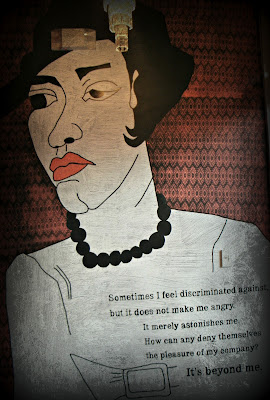Biting My Tongue Off:
Vulnerability Due to Intersecting Identities in Academia
I remember discussing
with a mentor the position of people of color in academia, especially at a
predominantly white research institution and discipline, and the expectation to
always play politics, manipulate professionalism, and constantly
self-censor. When someone questions my credential
instead of my paper I bite my tongue. When
someone makes me the subject, as opposed to the researcher, I bite my
tongue. When I’m constantly expected to
represent diversity, as the ONLY Black person in my department, I bite my
tongue. I want to say, “no I cannot, contrary to your racist ideologies, I do
not represent everything Black, please just let me do my research,” but then
I’m the angry Black woman, so I bite my tongue.
It always amazes me how one can have a 28-hour day and still harvest extreme feelings of emptiness and exhaustion from the simple, yet often essential, act of biting ones tongue. When I have to read the “theory” of the discipline, frequented with adjectives such as “long-faced negroes,” I bite my tongue. When I read something that offends me so much I hold back tears, I bite my tongue. When I want to scream from the rooftops, “NO MY HAIR IS NOT A TOPIC OF DISCUSSION AND YOU CANNOT TOUCH IT,” I bite my tongue and smile with, as Smokey Robinson said, tears from a clown.
I remember an
episode of A Different World, Mammy Dearest, where Whitley Gilbert wanted to
highlight the complexities of the Mammy caricature. Kim vehemently opposed, however, Mr. Gaines
told Kim, and I’m paraphrasing, she [mammy] is not smiling because she is
happy. In reality, she is smiling
because she knows how valuable she is on inside. This is her secret and gift. The show ended with a beautiful performance
elaborating this concept. My question is when does this gift stop being a
secret? I bite my tongue.
As a Black woman
in academia, disciplined by a field dominated by white folks who gaze and
“other,” I often become the subject in gatherings. This leads me to self-isolate
and then I am seen as not being serious about my work, when in reality I’m
trying, often unsuccessfully, not to go insane. I bite my tongue. I constantly
censor my thoughts, to the point that I do not realize that I am performing in
such a way until my mouth starts to bleed. My tongue is a thread from being
bitten off and permanently silencing me. I choke. The blood starts to gush and
I know, if not handled, I will not need to bite my tongue. I will, instead, become
a representation, a museum artifact, seen and not heard, but there when needed
to show “diversity.”
Being a forced
representative makes me a statistic. Inclusion inherently excludes. I remember seeing Zora Neale Hurston posing
as a museum exhibit, and the significance didn’t sink in until I realized, and
lived, many of the things that forced my sister (in my head) out of academia. I
am forced to ignore my other needs, and my life is placed on hold. I wait to
love, wait to live, wait to be me and with every growing day, I am anticipating
tomorrow, next month, next year. I bite my tongue.
In the exam
stage, I’m now expected to produce “stuff,” as one of my committee members
calls it. This stuff requires a “voice,” but where does this voice come from
when I barely have a tongue. A muscle that I have ignored, neglected, and
damaged to the extent of almost losing it. One of my committee members said to
me, “I can tell from your work what you like, but what do not you like? There’s
no critique.” I would have responded, but my tongue, from its damaged state,
would not form words. The blood was too
heavy and I choked back tears. It’s hard to critique when the overt policing in
the academy disciplined me to self-police, losing the ability to respond.
Tis the game of
academia, the first three years we tell you what the politics of the discipline
are, in this case, being the majority and “othering” the field population. If you cannot become white, try your best to
conform, but the consequences of such lead you to be voiceless, soul-less, lifeless,
and numb until you don ot even remember what it was you want to do with this
discipline, and I mean that in the literal sense, in the first place.
I have to take
my agency back and live by the words of the often forgotten Zora Neale Hurston,
“sometimes, I feel discriminated against, but
it does not make me angry. It merely astonishes me. How can any
deny themselves the pleasure of my company? It’s beyond me.”
At the end of
the day, I have to heal my tongue, find my voice, and reclaim my worth because
Queen Latifah said it best when she said, “it’s just another day.” I will never stop being oppressed, silenced,
and disciplined, but I can start exerting my agency, voice, and choice. I mend my
tongue. I heal my tongue. I love my tongue. I reclaim my voice.




No comments:
Post a Comment